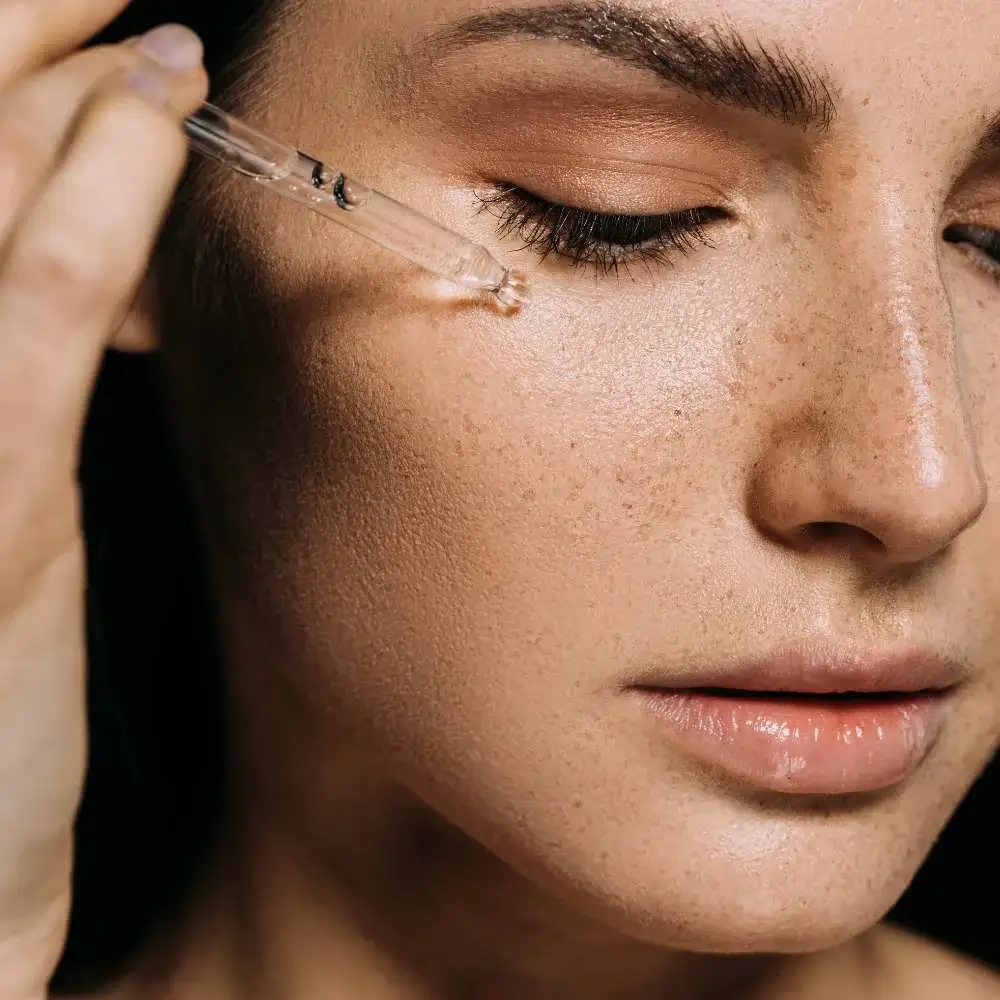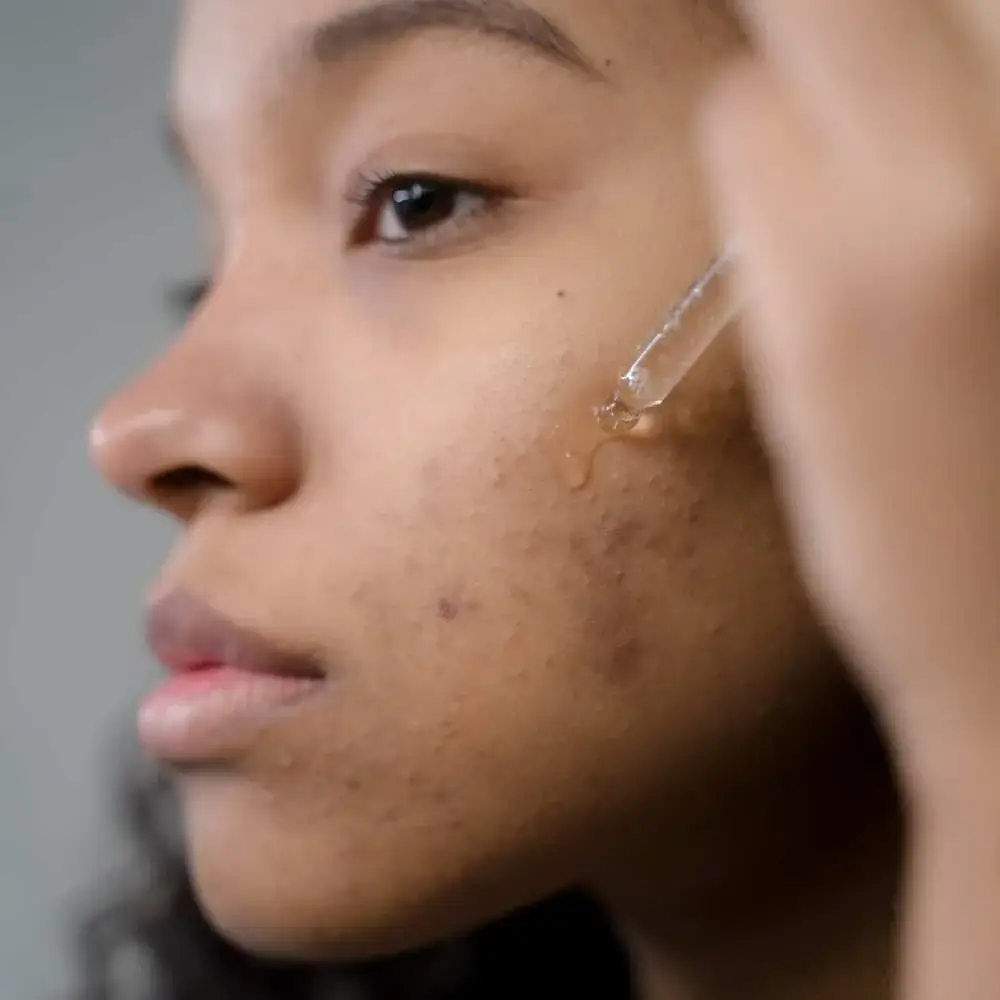Raise your hand if you're tired of hearing about miracle skincare products that promise to change your life! Well, buckle up, buttercup, because today we're diving into the world of Vitamin C serum – and this time, it's no joke. This brightening, antioxidant-packed potion has been making waves in the beauty realm, and for good reason. But what exactly is Vitamin C serum, and why should you care?
In a nutshell, Vitamin C serum is a powerful, skin-boosting elixir that helps brighten, tighten, and protect your complexion. But don't just take our word for it; keep reading to discover the science behind this radiant remedy, real-life success stories, and even tips on how to make your own DIY serum (hello, budget-friendly skincare!). Trust us, by the end of this article, you'll be singing the praises of Vitamin C serum just as loudly as we are.

The Role of Vitamin C in Skincare
Imagine the frustration of dealing with acne or dark spots, and how it can take a toll on your self-esteem. You've tried countless skincare products, but nothing seems to work. Then, you come across the magical ingredient: Vitamin C serum. Suddenly, you notice a significant improvement in your skin's appearance, and you can't help but wonder why you didn't discover this miracle potion sooner.
Vitamin C, also known as ascorbic acid, is an essential nutrient our body needs for various functions. However, its role in skin care is nothing short of impressive. From boosting collagen production to protecting against sun damage, Vitamin C is a powerhouse ingredient that can transform your skin for the better.
Collagen Production and Anti-Aging Benefits
As we age, our skin's natural collagen production declines, leading to fine lines and wrinkles. Vitamin C serum comes to the rescue by stimulating collagen synthesis, which helps maintain skin elasticity and firmness. By incorporating Vitamin C serum into your skincare routine, you're essentially giving your skin a fighting chance against the inevitable signs of aging.
Brightening and Evening Skin Tone
One of the most sought-after benefits of Vitamin C serum is its ability to brighten and even out skin tone. Hyperpigmentation, dark spots, and uneven skin tone are common issues many people face. Vitamin C serum works by inhibiting the enzyme responsible for melanin production, effectively reducing pigmentation and promoting a more radiant complexion.
Protection Against Sun Damage
Although not a replacement for sunscreen, Vitamin C serum acts as a potent antioxidant that neutralizes free radicals caused by sun exposure. By reducing oxidative stress, Vitamin C serum helps protect your skin from premature aging and maintains a youthful glow.
Reducing Inflammation and Soothing Irritated Skin
Inflammation is often the culprit behind various skin issues, including acne and redness. Vitamin C serum has anti-inflammatory properties that help soothe and calm irritated skin, making it an ideal addition to any skincare routine.
Accelerating Wound Healing
We've all experienced those pesky acne scars or small cuts that seem to take forever to heal. Vitamin C serum can speed up the wound healing process by promoting collagen production and reducing inflammation, helping you achieve a smoother, clearer complexion.
Vitamin C serum is a versatile and potent skincare ingredient that offers numerous benefits for various skin concerns. By incorporating this powerful antioxidant into your daily routine, you're investing in healthier, more radiant skin that will surely boost your confidence. So go ahead, give Vitamin C serum a try, and experience the magic for yourself!

Benefits of Vitamin C Serum for Acne-Prone Skin
Vitamin C serum has earned its place in the skincare hall of fame and for good reason. Its numerous benefits extend to various skin types, including acne-prone skin. If you're struggling with breakouts and blemishes, incorporating Vitamin C serum into your skincare routine could be a game-changer. Let's explore the ways in which this potent ingredient can benefit acne-prone skin.
Reduces Inflammation
Acne is often the result of inflammation, which can cause redness, swelling, and discomfort. Vitamin C serum has powerful anti-inflammatory properties that help soothe inflamed skin and reduce the appearance of acne.
Fights Acne-Causing Bacteria
One of the main culprits behind acne is the bacteria Propionibacterium acnes (P. acnes). Vitamin C serum has antimicrobial properties that can help combat P. acnes, reducing the likelihood of breakouts and promoting clearer skin.
Regulates Oil Production
Excess oil production can contribute to clogged pores and acne breakouts. Vitamin C serum helps regulate sebum production, maintaining a healthy balance and preventing potential breakouts caused by oily skin.
Improves Post-Acne Marks and Hyperpigmentation
Acne often leaves behind dark spots and post-inflammatory hyperpigmentation (PIH). Vitamin C serum is renowned for its brightening effects, as it inhibits melanin production and accelerates cell turnover. This helps fade acne scars and even out skin tone, revealing a more radiant complexion.
Boosts Collagen Production
Collagen plays a vital role in maintaining skin's elasticity and strength. By stimulating collagen production, Vitamin C serum can help repair acne-damaged skin and improve its overall texture.
Antioxidant Protection
Free radicals from environmental stressors like pollution and UV exposure can exacerbate acne and contribute to premature aging. Vitamin C serum acts as a powerful antioxidant, neutralizing free radicals and protecting your skin from further damage.
Enhances the Efficacy of Other Acne Treatments
Vitamin C serum can work synergistically with other acne-fighting ingredients, such as benzoyl peroxide and salicylic acid. By incorporating Vitamin C serum into your routine, you may be able to enhance the effectiveness of these treatments and achieve clearer skin faster.
Vitamin C serum offers a range of benefits for acne-prone skin, from reducing inflammation to fading post-acne marks. If you're looking to improve the health and appearance of your acne-prone skin, consider adding this powerful ingredient to your skincare arsenal. With consistent use, you'll be well on your way to a clearer, more radiant complexion.

How to Choose the Right Vitamin C Serum for Your Skin Type
Vitamin C serum is undoubtedly a game-changer in the world of skincare. But with so many options on the market, how do you choose the right one for your skin type? Fear not, as we're here to guide you through the process of finding the perfect Vitamin C serum that will cater to your specific needs.
Know Your Skin Type
The first step in selecting the right Vitamin C serum is to understand your skin type. Here's a quick rundown of the common skin types and their characteristics:
- Normal skin: Balanced, neither too oily nor too dry
- Oily skin: Excess oil production, prone to acne and enlarged pores
- Dry skin: Tight, flaky, and often feels uncomfortable
- Combination skin: A mix of oily and dry areas, typically an oily T-zone and dry cheeks
- Sensitive skin: Prone to redness, irritation, and allergic reactions
Pick the Right Form of Vitamin C
Not all Vitamin C serums are created equal. There are different forms of Vitamin C to choose from, each with its unique properties and benefits:
- L-Ascorbic Acid (LAA): The most potent and well-researched form of Vitamin C, LAA is highly effective but can be irritating for sensitive skin. Opt for a serum with a lower concentration (10-15%) if you have sensitive or dry skin.
- Magnesium Ascorbyl Phosphate (MAP): A water-soluble, more stable form of Vitamin C that's gentler on the skin. Suitable for all skin types, especially sensitive skin.
- Ascorbyl Palmitate: A fat-soluble form of Vitamin C that penetrates the skin easily but may not be as effective as LAA or MAP.
Check the Concentration
Vitamin C serums come in varying concentrations, typically ranging from 5% to 20%. If you're new to using Vitamin C, it's best to start with a lower concentration and gradually work your way up as your skin adapts.
- For sensitive or dry skin: Choose a serum with a concentration of 5-10%
- For normal or combination skin: Aim for a concentration of 10-15%
- For oily or acne-prone skin: Opt for a higher concentration of 15-20%
Examine the Ingredient List
Apart from the form and concentration of Vitamin C, pay close attention to the other ingredients in the serum. Look for additional antioxidants like Vitamin E and ferulic acid, which boost the efficacy of Vitamin C. Hyaluronic acid, niacinamide, and peptides are also excellent additions for added hydration and skin benefits.
Packaging Matters
Vitamin C is notoriously unstable and can degrade quickly when exposed to light and air. To ensure you're getting the most out of your serum, choose one that comes in an opaque, air-tight container with a pump or dropper.
By considering your skin type, the form and concentration of Vitamin C, and additional beneficial ingredients, you'll be well on your way to finding the perfect Vitamin C serum. With consistent use, you'll soon notice a brighter, healthier complexion that radiates confidence.

Application Tips for Optimal Results with Vitamin C Serum
Now that you've found the perfect Vitamin C serum for your skin type, it's time to learn how to apply it correctly to achieve optimal results. With these simple yet effective tips, you'll be well on your way to a brighter, more radiant complexion.
Cleanse Your Skin Thoroughly
Before applying your Vitamin C serum, make sure your skin is clean and free from dirt, oil, and makeup. This will ensure that the serum can penetrate your skin effectively and deliver its powerful benefits.
Apply to Damp Skin
For better absorption, apply your Vitamin C serum to damp skin right after cleansing. This allows the serum to lock in moisture and maximize its potency.
Use the Right Amount
A little goes a long way when it comes to Vitamin C serum. Typically, 2-3 drops are enough to cover your entire face. Remember, using too much can lead to irritation, especially if your skin is not used to the product.
Pat, Don't Rub
When applying the serum, gently pat it onto your skin using your fingertips. Avoid rubbing or tugging, as this can cause irritation and reduce the serum's effectiveness.
Wait for Absorption
Allow the serum to fully absorb into your skin before moving on to the next step in your skincare routine. This usually takes about 2-3 minutes. Applying other products too soon can dilute the serum and reduce its benefits.
Follow Up with Moisturizer and Sunscreen
After your Vitamin C serum has been absorbed, it's important to seal in the goodness with a moisturizer. This helps maintain your skin's hydration and barrier function. In the morning, always follow up with a broad-spectrum sunscreen with an SPF of at least 30 to protect your skin from harmful UV rays.
Be Consistent
Consistency is key when it comes to seeing results from your Vitamin C serum. Make it a part of your daily skincare routine, applying it once or twice a day as recommended by the product's instructions.
Monitor Your Skin's Reaction
Keep an eye on how your skin reacts to the Vitamin C serum, especially if you have sensitive skin or are new to using the product. If you notice any irritation, redness, or breakouts, consider reducing the frequency of application or switching to a lower concentration.
By following these application tips, you'll be able to unlock the full potential of your Vitamin C serum and achieve the glowing, healthy skin you've always desired. Remember, patience and consistency are crucial when it comes to reaping the benefits of this powerful skincare ingredient.

The Essential FAQs for Your Brightest Skin Yet!
How Long After Applying Vitamin C Serum Should You Wait Before Applying Moisturizer?
Well, it's a bit like a skincare dance, and the rhythm depends on your skin type! If you have oily or combination skin, feel free to apply your moisturizer right after the Vitamin C serum – no waiting is required. But if your skin is on the drier side, give your fabulous Vitamin C serum about five minutes to work its magic before sealing in the goodness with your moisturizer.
Does Vitamin C Help Acne?
You betcha! This marvelous potion not only tames the fiery inflammation of acne but also bids farewell to redness and discoloration from breakouts. And those pesky dark spots and scars left by acne? Consider the history, as Vitamin C brightens and evens out your complexion like a charm.
So, let's talk about the Vitamin C serum tango with moisturizer – the steps vary based on your skin type. If you're rocking oily or combination skin, go ahead and apply your moisturizer right after the serum. But for our dry-skinned friends, wait about five minutes before sealing in that Vitamin C goodness with your favorite moisturizer.
And just when you thought we couldn't love Vitamin C anymore, it turns out it does help reduce acne! By calming inflammation and fading discoloration, your blemishes will be singing their swan song in no time.
What is a Vitamin C serum?
This delightful elixir is a skincare superstar packed with—you guessed it—Vitamin C! It comes in the form of a lightweight liquid that your skin will just drink up. This wonder potion is known for its ability to brighten and even out your complexion, say "ta-ta" to dark spots, and give a helping hand in the battle against fine lines and wrinkles. But wait, there's more! Vitamin C serum also acts as a trusty sidekick, protecting your skin from pesky free radicals and environmental stressors. So, if you're looking for a skincare hero that'll swoop in and save the day, look no further than Vitamin C serum!
How do I apply Vitamin C serum?
First, make sure your skin is squeaky clean, and free from makeup, dirt, and oil. Next, while your skin is still slightly damp, take 2-3 drops of the Vitamin C serum – remember, a little goes a long way! Now, gently pat the serum onto your face using your fingertips, avoiding any rubbing or tugging that could upset your skin. Once you've covered your entire face, give the serum a few minutes to fully absorb and work its magic. And voilà! You've just applied Vitamin C serum like a skincare maestro. Don't forget to follow up with your favorite moisturizer and SPF to keep your skin happy and protected. Happy serum-ing!
Can I use Vitamin C serum if I have sensitive skin?
The key is to find a serum that's gentle and formulated specifically for sensitive skin – look for one with a lower concentration of Vitamin C to start. When you're ready to give it a whirl, perform a patch test on a small area of your skin (like behind your ear or on your wrist) to make sure there's no irritation. If all goes well, go ahead and apply the serum as you normally would, but keep an eye on how your skin reacts. If you notice any redness, itching, or stinging, it might be best to reduce the frequency of application or consult with a dermatologist. Remember, every skin type is unique, so listen to what yours is telling you. Good luck, and may the Vitamin C serum be ever in your favor!
Read our article about best eyeliner for waterline here!
Read our article about best clear lip gloss here!
Read our article about best drugstore face wash here!







